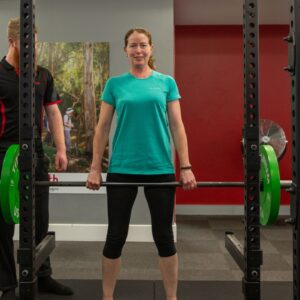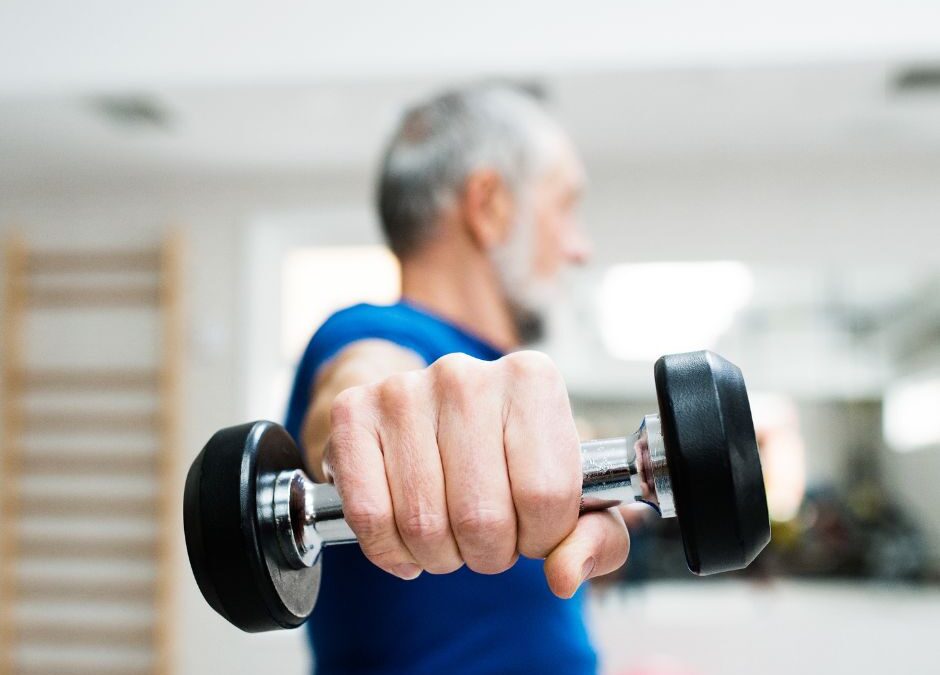There’s a common misconception that lifting weights is only for younger people.
Let’s knock that myth on the head right now: Lifting weights (also known as resistance training, or strength training) is just as important for adults over 50 as it is for those in their 20s and 30s.
First, let’s unpack the many and varied benefits that come with resistance training. Research has shown that lifting weights can help:
- improve cognitive function, metabolism and balance
- reduce the risk of injuries, and
- positively impact your lifespan on a cellular level making you feel more vibrant.
Weight training can also have a positive effect on a person’s health in terms of risk factors for cardiovascular disorders, cancer, diabetes, and osteoporosis.
Plus, it’s the only type of exercise that can substantially slow – and even reverse – the declines in muscle mass, bone density, and strength that were once considered inevitable consequences of aging.
Combat loss of muscle mass
Progressive strength and resistance training is accepted in treating sarcopenia, which refers to age-related loss of muscle mass and/or physical function leading to muscular weakness.
After age 50, muscle mass decreases at an annual rate of 1–2%. The decline in muscle strength is even higher, amounting to 1.5% per year between ages 50 and 60, and 3% per year thereafter.
It is estimated that 5–13% of people aged 60–70 years are affected by sarcopenia, increasing to 11–50% for those aged 80 or above.

The research keeps stacking up
In 2009, a review of 121 trials including over 6700 participants concluded that progressive resistance training was an effective intervention for improving physical functioning in older people, including improving strength and the performance of some simple and complex activities.
Most of the trials reviewed involved high intensity training two to three times per week.
Benefits included large positive effects on both muscle mass (hypertrophy) and strength.
The message is loud and clear!
If you’re over 50 and haven’t lifted weights before, now is the time to start.
And no, we don’t have to go at it like 76-year-old Arnold Schwarzenegger in order to get fit and strong! 💪
The National Strength and Conditioning Association recommends older adults perform strength training exercises two to three days a week for a duration of 20-30 minutes each session.
Focus on activating major muscle groups through a variety of different bodily movements; this is essential in challenging your skeletal and muscular systems.
The aim should be to identify and understand the appropriate weight or resistance to achieve 10-15 repetitions before the muscles undergo fatigue.
If you’re over 50 and keen to start lifting weights, we recommend you seek guidance from a health professional (like the physios and exercise physiologists here at MD Health) to ensure your program is tailored to your needs.
Also, it’s important to learn how to lift weights properly with correct form and activation from the beginning.
Being smart with how you start your weightlifting journey is essential in not only preventing injuries but enhancing function and performance to achieve your goals.
Traps for ‘young’ players
We see many common mistakes individuals of all ages make when starting strength training. Here are the big ones:
- Going too heavy too soon: It’s important to ease into things and gradually increase the weight you’re lifting over time (‘progressive overload’). Going too heavy too soon can lead to injury.
- Not using proper form: Form is key when lifting weights, no matter your age. Make sure you’re using correct/optimal form to get the most out of your workout and avoid injury.
- Not warming up: Always warm up before lifting weights, especially as you get older. Dynamic (active) stretching and light cardio will help get your muscles ready for a more intense workout.
- Not cooling down: Just as important as warming up is cooling down after your workout. Static (passive) stretching and do some light cardio to help your body recover from lifting weights.
- Not staying hydrated: Drinking plenty of water is essential for anyone working out, but it’s especially important as you get older. Stay hydrated throughout your workout and throughout the day to keep your body healthy and prevent injuries.
While “no pain, no gain” may be a well-worn mantra in the weight room, fact is you should not experience pain while lifting weights.
Yes, some discomfort is to be expected as you work the muscle to fatigue.
When muscles are challenged by resistance, tissue breakdown occurs. That’s natural. It’s normal to feel some soreness the day after a workout as the muscle fibres heal and become stronger.
But if you feel joint or nerve pain, or you’re putting a tremendous amount of strain on any part of the body, most likely your lifting form, or technique, is incorrect. You’re probably also lifting an inappropriate weight.
Strains, sprains, and tissue damage can take weeks or even months to heal but with the guidance from a health professional, the management of these conditions can be addressed and treated accordingly.
Tips for sticking with it
One of the hardest things about starting a strength training program, or any new form of exercise, is sticking with it. Some things that may help:
- Schedule your strength training during times in the day or week when you feel most energetic versus when you tend to feel run down.
- Mark your calendar each week with the day and time you will do your exercises and check if off when it’s complete.
- Ask friends or family members to join you to help give you a boost of motivation and social support.
- Increase the number of exercises and weights gradually.
Boost your health
In conclusion, beginning a strength training exercise routine after the age of 50 will ultimately boost your health in numerous ways, including maintaining muscle mass/function, strengthening bones, easing joint pain, and increasing your quality of life overall.
These benefits will improve your everyday functional movements such as carrying groceries, bending forward to pick things up, and providing you with the capacity to achieve your life goals to feel your best for the years to come.
If you’d like to discuss how a tailored strength training program might work for you and your situation, please don’t hesitate to reach out to us here at MD Health. Book in your free full body assessment here (scroll to bottom).
References:
- Fragala MS, Cadore EL, Dorgo S, et al. Resistance training for older adults: position statement from the National Strength and Conditioning Association. J Strength Cond Res. 2019;33(8):2019-2052. doi:10.1519/JSC.0000000000003230
- Rosenberg IH. Summary comments. Am J Clin Nutr. 1989;50:1231–1233.
- Abellan van Kan, G. (2009). Epidemiology and consequences of sarcopenia. JNHA-The Journal of Nutrition, Health and Aging, 13, 708-712.
- Liu, C. J., & Latham, N. K. (2009). Progressive resistance strength training for improving physical function in older adults. Cochrane database of systematic reviews.
Do you have any questions?
- Call us on (03) 9857 0644 or (07) 3505 1494 (Paddington)
- Email us at admin@mdhealth.com.au
- Check out our other blog posts here
Our clinical staff would be happy to have chat if you have any questions.
Take the first step to a healthier you!
Would you prefer for someone to contact you regarding booking your Initial Physiotherapy appointment, Initial Exercise Physiology, Initial Osteopathy session or FREE Full Body Assessment*?
Or do you have any other enquiry about our services at MD Health?
Please fill in this form and someone from MD Health will be in touch with you soon.
Alternatively please call us on 03 9857 0644 (Kew East), 03 9842 6696 (Templestowe), 03 8683 9442 (Carlton North) or 07 3505 1494 (Paddington) to book now!
*Please note only the Full Body Assessment is a FREE service. The Full Body Assessment is for new clients at MD Health or returning clients who haven’t been in for 6 months or longer who intend to particpiate in our 13 Week Clinical Pilates Program**.
For all new clients who wish to come in for a one-off, casual or adhoc basis for Physiotherapy or Exercise Physiology the Initial Physiotherapy or Initial Exercise Physiology appointment is a paid service.
** The 13 Week Clinical Pilates Program at MD Health is not a lock in contract and you are not required to attend for the full 13 weeks if you do not wish.
This site is protected by reCAPTCHA and the Google Privacy Policy and Terms of Service apply.




